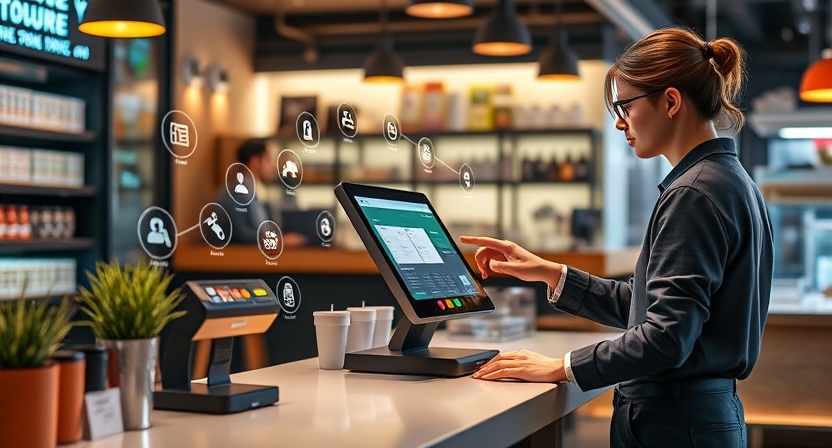
By Barbara Thomas December 7, 2024
In today’s business environment, delivering outstanding customer experiences is not just a choice—it is a necessity. Modern consumers anticipate convenience, personalization, and efficiency at all interactions. Integrated POS systems are leading the way for businesses to fulfill these expectations. By optimizing processes and providing a smooth experience, these systems enable companies to boost customer satisfaction while increasing overall efficiency.
What Are Integrated POS Systems?

Integrated POS systems are advanced platforms that consolidate various business functions into a single system. Unlike traditional POS systems, which primarily handle basic sales transactions, integrated solutions go a step further by combining inventory management, customer data, payment solutions, and reporting tools.
These systems offer a comprehensive perspective on business activities, enabling real-time monitoring and smooth collaboration among various departments. For example, a unified POS system can instantly update inventory counts post-sale, guaranteeing precise stock control. Furthermore, it is capable of gathering customer information to assist companies in comprehending purchasing behaviors and inclinations. This integration lessens manual labor, decreases mistakes, and fosters a more unified operational framework.
By implementing an integrated POS system, businesses not only streamline their processes but also set the stage for delivering a superior customer experience, ensuring that every interaction is smooth and hassle-free.
The Role of Integrated POS Systems in Enhancing Customer Experience

Integrated POS systems are powerful tools for improving the customer journey. At their core, they simplify and enhance the shopping process, making it more efficient and enjoyable.
One key advantage is the ability to offer faster, more flexible transactions. Customers value their time, and long checkout lines or payment delays can lead to frustration. Integrated POS systems speed up this process by supporting multiple payment solutions, such as credit cards, digital wallets, and contactless payments. This flexibility caters to diverse customer preferences, ensuring a seamless payment experience.
Additionally, integrated POS systems allow companies to offer tailored interactions. Through the use of customer data, companies can develop personalized promotions, suggest products based on past purchases, and provide unique rewards. These individualized details demonstrate to customers that their preferences are valued, cultivating trust and loyalty.
Another major advantage is the capability to provide a uniform experience across various sales channels. Integrated POS systems connect data across online and offline platforms, enabling customers to transition between them seamlessly. Regardless of whether customers are shopping in-person or online, they experience equal convenience and service, which boosts their overall satisfaction.
Business Benefits of Enhanced Customer Experiences

Delivering an exceptional customer experience has a ripple effect on business success. Beyond satisfying customers, it drives tangible benefits that contribute to long-term growth.
One of the primary advantages is improved customer retention. Happy customers are more likely to return, and integrated POS systems play a crucial role in this by enabling businesses to implement effective loyalty programs. These systems allow customers to earn and redeem points seamlessly, encouraging repeat purchases and building a loyal customer base.
Improved customer experiences also result in higher revenue. Integrated POS systems simplify the provision of upselling and cross-selling chances at the checkout stage. For instance, a company can recommend related items based on a customer’s buying patterns, boosting sales without being overbearing https://buycardmachines.com/can-high-risk-merchants-use-a-cash-discount-program/.
Ultimately, a properly executed integrated POS system enhances a business’s reputation. Streamlined, effective processes and tailored services create a memorable impact on clients, enhancing brand image. This favorable perception draws in new clients and strengthens the loyalty of current ones, establishing a cycle of growth and achievement.
Features of Integrated POS Systems That Drive Customer Satisfaction

The unique features of integrated POS systems are designed to enhance customer satisfaction by addressing common pain points and improving efficiency.
One standout feature is real-time inventory management. Customers often face disappointment when desired products are unavailable. Integrated POS systems eliminate this issue by providing accurate, up-to-date inventory information. This not only ensures availability but also allows businesses to offer alternatives or pre-order options, keeping customers satisfied.
Another valuable feature is the seamless management of loyalty and reward programs. Integrated systems allow customers to track their points and rewards easily, simplifying their experience. By rewarding customers for their loyalty, businesses can foster stronger relationships and increase engagement.
The simplicity of returns and exchanges is yet another aspect where integrated POS systems excel. Centralized data allows companies to handle these transactions swiftly, minimizing confusion and avoiding delays. Customers value the ease, which improves their overall experience.
Ultimately, integrated POS systems provide extensive analytics and reporting features. These tools assist companies in comprehending customer behavior, allowing them to adjust strategies and provide products or services that connect with their audience.
Overcoming Challenges in Adopting Integrated POS Systems

While the benefits of integrated POS systems are clear, businesses may face certain challenges during implementation. However, these challenges can be effectively addressed with the right approach.
One common hurdle is the initial investment cost. Integrated POS systems require a significant upfront investment, which can be a concern for small businesses. To overcome this, businesses should focus on the long-term benefits, such as improved efficiency and increased revenue, which far outweigh the initial expense. Additionally, many vendors offer flexible payment plans to ease the financial burden.
A further challenge lies in the difficulty of moving from conventional systems to integrated solutions. Employees might require time to adapt to the new technology. Offering extensive training and continuous assistance can guarantee a seamless transition. Collaborating with a trustworthy supplier that provides practical support can simplify this process significantly.
Potential concerns also include system downtime and technical issues. Nonetheless, these risks can be reduced by selecting a reputable POS provider known for its reliability and excellent customer service. Consistent upkeep and updates additionally guarantee that the system operates seamlessly without disruptions.
By addressing these challenges head-on, businesses can fully unlock the potential of integrated POS systems and enjoy their numerous benefits.
The Future of Customer Experience with Integrated POS Systems.

The evolution of integrated POS systems shows no signs of slowing down, with new technologies continually shaping their future. As customer expectations grow, these systems are set to play an even more significant role in delivering outstanding experiences.
A developing trend is the incorporation of AI into POS systems. Systems powered by AI can evaluate customer information in real time, offering greater insights into purchasing habits and preferences. This enables companies to foresee customer requirements and provide tailored suggestions, elevating customer experience to unprecedented levels.
The IoT is yet another advancement shaping the future of integrated POS systems. Devices equipped with IoT technology can link with POS systems to streamline tasks such as inventory management, enhancing operational efficiency.
Mobile POS systems are also gaining popularity, offering businesses the ability to process payments anywhere. This flexibility is particularly valuable for service-oriented industries, such as restaurants and events, where traditional fixed POS setups may not be practical.
As these innovations become more accessible, businesses that embrace integrated POS systems will be better equipped to meet the evolving demands of their customers, ensuring long-term success.
Conclusion

Integrated POS systems are a powerful tool for enhancing customer experience and improving business efficiency. By streamlining transactions, personalizing services, and unifying sales channels, these systems empower businesses to meet the needs of modern consumers while driving growth.
Investing in a comprehensive POS system is a strategic choice that yields benefits such as improved customer satisfaction, boosted revenue, and enhanced brand loyalty. As technology keeps advancing, these systems will stay central to providing outstanding customer experiences, assisting businesses in prospering in a constantly competitive market.